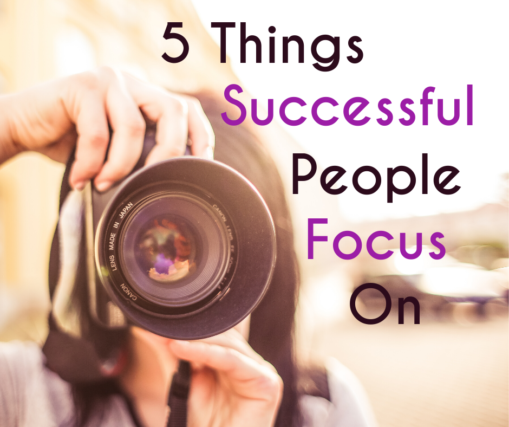
If you’d like to increase your happiness, your motivation and your productivity, FOCUS on the following five tactics and strategies!
1. Find and Repeat a Positive Affirmation:
- I will succeed…
- I am confident…
- I can do this….
- I can handle this…….
- I can figure this out……..
- I have everything I need to get through this….
- I’ll figure it out….
- This challenge is making me stronger….
Repeat positive affirmations throughout the day when negativity arises.
2. Make a list of all your successes and visualize them while feeling those feelings of pride and accomplishment. You’ll immediately feel better.
- I made it through college…
- I’ve successfully survived many obstacles in my life..
like the time such and such happened
or the time I was______________
etc. etc.
- I’m really good at my job
- I’m a pretty good mother/father
- I’m a good friend
- People respect me
- I completed that last big project
Focusing on your successes versus your failures is a great way to pull yourself up and feel positive and motivated for the future.
It’s too easy to forget about all the good things!
3. Each day, find a VALUE word that gives you a sense of meaning and purpose. Write it down and reflect on it once every hour.
Peace, Kindness, Purpose, Accomplishment, Appreciation, Achievement, Calmness, Commitment, Compassion, Concentration, Confidence, Courage, Capable, Creativity, Decisiveness, Determination, Discipline, Enthusiasm, Excitement, Faith, Fearlessness, Focus, Gratitude, Hopefulness, Impact, Love, Motivation, Optimism, Persistence, Perseverance, Self-Control, Empathy, Simplicity, Strength, Success, Trust, Truth, Understanding, Vision, Victory, Willingness, Wisdom
The words you focus on make a difference!
4. Write one simple goal down for each hour. When you get off track and you mind starts to wander, pull it back to that one goal that you are working on this hour.
- In the next hour I will accomplish
- My goal for the next one hour is to
- The one thing I will absolutely complete in the next hour is:____________
Staying focused on and completing one thing
can help you feel motivated and encouraged.
5. Focus on what’s going well. At the end of the day write down 3 things you did well. You can also do this periodically throughout the day.
- This morning I got ___________done.
- I had the courage to have a difficult conversation.
- I got two things checked off my list.
- I handled that situation pretty good.
- I stayed positive most of the day.
Humans have an inborn tendency to notice what’s bad more easily than what’s good. It’s not our fault–our brains are actually wired that way–Our ancestors who were quick to see threats were more likely to survive.
You’ve probably been making significant progress on several projects. But being human, you are probably focusing your attention on everything you haven’t accomplished.
Once you’re in the energy of what’s going right and what you have gotten done, it’s easier to see all the things that are going right.
Focus on what’s going right because it will
make you happier, and being happy
will make you more motivated
and being more motivated will
make you more productive.
So
1. Focus on Positive Affirmations
2. Focus on Successes & feel pride & accomplishment
3. Focus on a Word that gives meaning & purpose
4. Focus on one goal per hour
5. Focus on what’s going well
You’ll feel better, happier, more motivated and get more done!
______________________________________________
IF YOU’VE EVER thought about how wonderful it would be to get some support to make some changes in your life–
Contact me to set up a FREE, NO OBLIGATION 30 minute call to discover minute how Personal Life Coaching can help you or someone you know to begin making positive changes in life!
E-mail: fay@fayprairie.com
Phone: 507-829-0181
I specialize in helping people to develop positive, empowering mindsets to strengthen and empower yourself to deal with whatever life situations are weighing you down.
As you strengthen and empower yourself, you’ll be more resilient to stress, anxiety, worry, negativity, and depression, so you can be a Better You, have Better Relationships and live a Better Life!
I also provide speaking and workshops for businesses and schools. Check out my speaking page https://www.fayprairie.com////speaking





